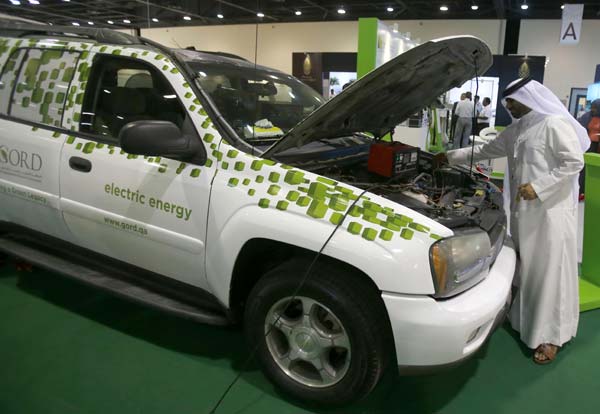Equity 'not addressed' in climate talks
Updated: 2012-12-01 02:56
By Wu Wencong in Doha, Qatar (China Daily)
|
||||||||
Long-term equity concerns are not being adequately addressed in climate negotiations so far, said Chinese scholars, emphasizing that equity is not a barrier to further emission reductions, but a key enabler of them.
 |
|
A man inspects the engine of a hybrid test car at a display of environment friendly vehicles during the United Nations 18th Climate Change Conference in Doha on Friday. Karim Jaafar / Agence France-Presse |
At a side event held at the China Pavilion on Friday, scholars from China released a report on developed and developing countries' responsibilities for climate change and carbon dioxide mitigation using a model generated by independent research.
It shows that developed countries accounted for about two-thirds of global warming from 1850 to 2005, but they only contributed to one-third of mitigation efforts. The case for developing countries is just the opposite: They accounted for one-third of global warming, but contributed to two-thirds of the mitigation efforts.
Current commitments by developed countries cannot effectively curb climate change, nor do they reflect their ethical responsibility, said Cui Xuefeng from Beijing Normal University, one of the report's authors.
"Stronger mitigation efforts by developed countries are needed to keep temperature rise below the 2 C objective on the basis of equity in the future," he said.
A report released by the UN Environment Program and the European Climate Foundation on Nov 20 showed that the emissions gap is bigger than earlier assessments. Current greenhouse gas emission levels are already about 14 percent above where they need to be in 2020.
Li Ting, senior policy consultant from the School of Public Policy and Management of Tsinghua University, said emphasizing equity does not mean that developing countries care only about emission rights, nor does addressing the importance of "common but differentiated responsibilities" mean taking no action.
"I really think the rights to development are much bigger and meaningful than just emission rights," said Li.
She said sustainable development is the only approach to the future of the Earth and its climate system. Without poverty eradication and sustainable development, human beings will not be able to protect the climate. "The current way of sharing is not sustainable and not fair," she said.
The report released on Friday was published in the journal Proceedings of the National Academy of Sciences of the United States of America in August. The models applied for the research will be used in the fifth Assessment Report of the Intergovernmental Panel on Climate Change.
Contact the writer at wuwencong@chinadaily.com.cn- Focus of Doha climate talks
- Call for action at climate talks in Doha
- China urges turning climate talks into action
- 35 nations meet over stalled climate talks
- UN says climate talks will miss Kyoto deadline
- Climate talks intensify, negotiators see progress
- Developing countries seek commitment on climate funds

 Relief reaches isolated village
Relief reaches isolated village
 Rainfall poses new threats to quake-hit region
Rainfall poses new threats to quake-hit region
 Funerals begin for Boston bombing victims
Funerals begin for Boston bombing victims
 Quake takeaway from China's Air Force
Quake takeaway from China's Air Force
 Obama celebrates young inventors at science fair
Obama celebrates young inventors at science fair
 Earth Day marked around the world
Earth Day marked around the world
 Volunteer team helping students find sense of normalcy
Volunteer team helping students find sense of normalcy
 Ethnic groups quick to join rescue efforts
Ethnic groups quick to join rescue efforts
Most Viewed
Editor's Picks

|

|

|

|

|

|
Today's Top News
Health new priority for quake zone
Xi meets US top military officer
Japan's boats driven out of Diaoyu
China mulls online shopping legislation
Bird flu death toll rises to 22
Putin appoints new ambassador to China
Japanese ships blocked from Diaoyu Islands
Inspired by Guan, more Chinese pick up golf
US Weekly

|

|






